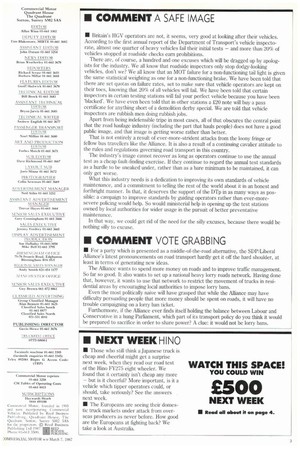• COMMENT A SAFE IMAGE • Britain's HGV operators are
Page 5

If you've noticed an error in this article please click here to report it so we can fix it.
not, it seems, very good at looking after their vehicles. According to the first annual report of the Department of Transport's vehicle inspectorate, almost one quarter of heavy vehicles fail their initial tests — and more than 20% of vehicles stopped at roadside checks earn prohibitions.
There are, of course, a hundred and one excuses which will be dragged up by apologists for the industry. We all know that roadside inspectors only stop dodgy-looking vehicles, don't we? We all know that an MOT failure for a non-functioning tail light is given the same statistical weighting as one for a non-functioning brake. We have been told that there are set quotas on failure rates, set to make sure that vehicle operators are kept on their toes, knowing that 20% of all vehicles will fail. We have been told that certain inspectors in certain testing stations will fail your perfect vehicle because you have been 'blacked'. We have even been told that in other stations a £20 note will buy a pass certificate for anything short of a demolition derby special. We are told that vehicle inspectors are rubbish men doing rubbish jobs.
Apart from being indefensible tripe in most cases, all of that obscures the central point that the road haulage industry (including the part that hauls people) does not have a good public image, and that image is getting worse rather than better.
That is not entirely a result of ever-more-strident attacks from the loony fringe or fellow bus travellers like the Alliance. It is also a result of a continuing cavalier attitude to the rules and regulations governing road transport in this country.
The industry's image cannot recover as long as operators continue to use the annual test as a cheap fault-finding exercise. If they continue to regard the annual test standards as a hurdle to be sneaked under, rather than as a bare minimum to be maintained, it can only get worse.
What this industry needs is a dedication to improving its own standards of vehicle maintenance, and a commitment to telling the rest of the world about it in an honest and forthright manner. In that, it deserves the support of the DTp in as many ways as possible: a campaign to improve standards by guiding operators rather than ever-moresevere policing would help. So would ministerial help in opening up the test stations owned by local authorities for wider usage in the pursuit of better preventative maintenance.
In that way, we could get rid of the need for the silly excuses, because there would be nothing silly to excuse.












































































































